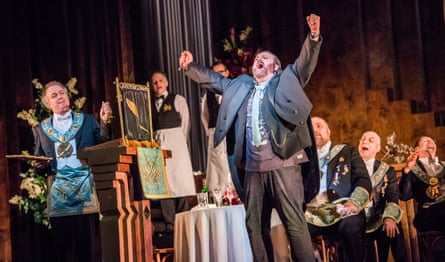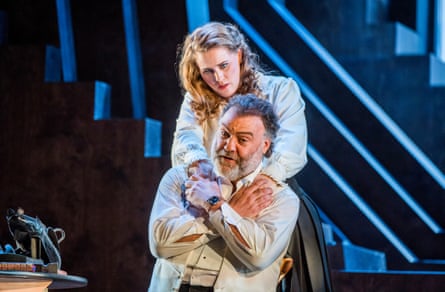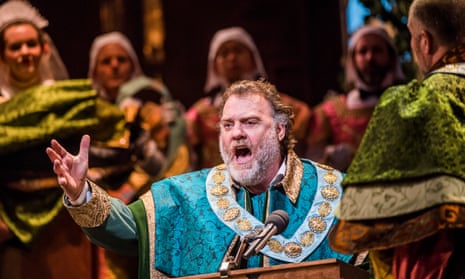Kasper Holten is going out with a bang. The final production of Covent Garden’s outgoing director of opera is of Wagner’s four-and-a-half-hour comedy, and it’s bigger than anything he has yet done here. Pretty much every musician the Royal Opera has on its books must be involved at some point – even chorus master William Spaulding has an onstage cameo.
Holten sets the work in some kind of livery hall. The towering marble walls of Mia Stensgaard’s set suggest Albert Speer – this is definitely Germany – but the ambience starts off somewhere between Downton Abbey and ’Allo ’Allo.

The Mastersingers are liverymen, glorying in ever more delightfully elaborate gowns and hats – Anja Vang Kragh has had fun designing the costumes. We first see them arriving for dinner and cigars wearing masonic bibs, and some of them even arrive with – gasp – women, though these are quickly led off to pass their evening somewhere out of sight. Eva, whose hand is the prize for their singing competition winner, ends up trussed into a gold frock shaped like the trophy she is.
Into this world comes Walther, looking like he rode in on the Hairy Bikers’ sidecar, with a greased-back mullet and wearing a band T-shirt under a tailcoat. In Gwyn Hughes Jones’s performance his arrogance and anger is very close to the surface; he moulds his penetrating tenor voice into honeyed lines for the winning song, but when he vents his frustration earlier on it’s as though he’s auditioning for Mime, the Ring cycle’s poison dwarf.

The problem – and it’s a big one – is that while Holten’s proud yet claustrophobic setting works well for the public scenes, he’s stuck with it for Act 2, where it’s an uneasy fit. There’s no insight for us into the community within which this little liveried world exists; instead we seem to be receding into our cobbler-hero Hans Sachs’s head. The riot at the end of the act is a full-on nightmare scene – including, incidentally, what might be a sneaky tribute to the much-loved production by Graham Vick that this one has replaced.
And then, the morning after: Act 3 uses the revolving stage to show the livery hall as merely a stage. Everything is a performance. All this might work for Wagner’s gods-and-monsters operas, but Die Meistersinger is a very human drama, and there’s a distance between us and the characters that even these vivid yet slightly unfocused performances can’t bridge.

Rachel Willis-Sørensen brings an incisive soprano to pouty Eva. Bryn Terfel is charismatic as ever as Sachs, and touching in later scenes as he realises Eva is going her own way, but his once infallibly smooth baritone is taking on a pronounced beat when he pushes it. And, though the warmth and precise colour of their playing for conductor Antonio Pappano is mostly to be relished, the orchestra needs to take things down in the conversational passages. Allan Clayton shines as Sachs’s apprentice David, and Johannes Martin Kränzle gives a performance of wonderful nuance as poor, insufferable Beckmesser.
“Kinder, schafft Neues!!” Walther scrawls on the wall at one point, quoting Wagner, who was imploring his future interpreters to shake things up a bit. Holten, whose tenure here has seen its share of artistic controversy, might have included this in his own defence. In any case, he’s leaving the company with a production nobody will forget in a hurry.

Comments (…)
Sign in or create your Guardian account to join the discussion